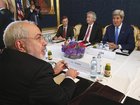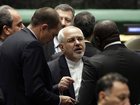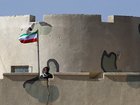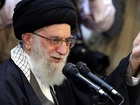Discussions over a controversial Iranian grant to the Lebanese army have been “frozen” to avoid any rift between cabinet members as the United States pressed to “delay” the matter until other arming pledges are met.
According to the pan-Arab daily Asharq al-Awsat, Prime Minister Tammam Salam is stalling all discussions at cabinet meetings over the matter to prevent any crisis between its two main components Hizbullah and al-Mustaqbal movement.
 Full Story
Full Story
A strong 5.6 earthquake rocked two cities in western Iran Wednesday, injuring at least 16 people but causing only minor damage to homes, U.S. and Iranian sources said.
The quake occurred just after 5:00 pm (1330 GMT), with the epicenter 51 kilometers (32 miles) east of Dehloran in Ilam province, close to the border with Iraq, according to the U.S. Geological Survey.
 Full Story
Full Story
Ensconced for hours in a Vienna hotel room, U.S. Secretary of State John Kerry and his Iranian counterpart tried Wednesday to resuscitate troubled talks about limiting Tehran's nuclear program.
Iran and six world powers have less than six weeks, until November 24, to strike a comprehensive accord meant to prevent Tehran from developing nuclear weapons under the cover of its civilian atomic program, in exchange for eased sanctions.
 Full Story
Full Story
Israeli Defense Minister Moshe Yaalon said Wednesday that Hizbullah might have more self-confidence, days after the party's chief Sayyed Hassan Nasrallah pledged to defeat jihadists and expressed readiness for a new confrontation with the Jewish state.
“It’s possible that Hizbullah has accumulated more self-confidence than we thought,” Yaalon told Haaretz daily in an interview.
 Full Story
Full Story
Iran's foreign minister said Tuesday "numerous questions" remain as he arrived for fresh talks with the United States and the European Union aimed at breaking a deadlock in nuclear negotiations.
The two sides have just six weeks to finalize an accord aimed at easing fears that Iran might obtain nuclear weapons after more than a decade of rising tensions.
 Full Story
Full Story
Iran must withdraw its "occupying" forces from Syria to help resolve that country's conflict, Saudi Foreign Minister Prince Saud al-Faisal said Monday after talks with his German counterpart.
"Our reservations are about Iran's policy in the region, not about Iran as a country or people," Prince Saud said at a joint press conference in the Red Sea city of Jeddah with Germany's Frank-Walter Steinmeier.
 Full Story
Full Story
Three Iranian police commanders who were heading south to investigate rebel attacks on security forces have died in a plane crash, state broadcasters and agencies reported Sunday.
The plane, a turbo-propeller aircraft belonging to the national police, had seven people on board when it disappeared from radar in the restive Sistan-Baluchistan province, which borders Pakistan.
 Full Story
Full Story
Gulf monarchies taking part in U.S.-led air strikes against the Islamic State jihadist group in Syria could deploy special forces on the ground but only if certain conditions are met, analysts say.
Sunni-ruled Saudi Arabia, Bahrain, Qatar and the United Arab Emirates have joined air strikes on the IS, which has seized swathes of Syria and neighbouring Iraq.
 Full Story
Full Story
One of Iran's top nuclear negotiators signaled on Friday that talks with world powers could be extended beyond November's deadline, given big barriers standing in the way of a deal.
With both sides speaking of wide gaps in what limits should be placed on Iran's nuclear program, the next round of talks will take place in Vienna on Tuesday and Wednesday.
 Full Story
Full Story
Iran released a video Friday showing supreme leader Ayatollah Ali Khamenei on his first outdoor walk since undergoing prostate surgery, as part of a more open policy on his health.
In an unprecedented step last month, the Islamic republic publicized Khamenei's hospital treatment, which followed years of widespread rumors that he had prostate cancer.
 Full Story
Full Story



